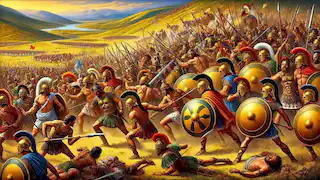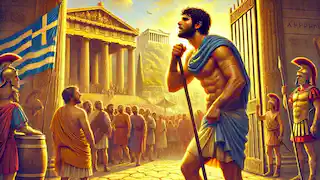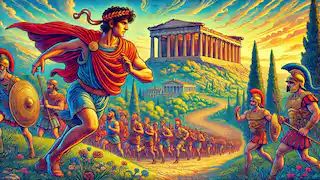The Prelude to War
In the year 490 BCE, the land of Greece was a mosaic of city-states, each fiercely independent yet culturally united. Athens, known for its democracy and wisdom, found itself in a perilous position. The mighty Persian Empire, led by King Darius, sought to expand its dominion over Greece. The Athenians, aware of the Persian threat, prepared to defend their freedom and way of life.
The Persians, known for their vast and well-organized army, were an intimidating force. The Athenians, though fewer in number, were resolute. They knew that they needed the support of their fellow Greeks, particularly the Spartans, renowned for their warrior culture. To this end, they sent their fastest runner, Pheidippides, on a crucial mission to seek Spartan aid.
Pheidippides' Journey to Sparta
Pheidippides, an experienced runner known for his endurance, embarked on the journey to Sparta, covering nearly 150 miles in just two days. The path was treacherous, cutting through mountains and valleys, under the blazing sun and through the cool of night. Pheidippides ran with a singular purpose, knowing that the fate of Athens rested on his shoulders.
As he ran, he passed through various Greek city-states, each with its own unique culture and way of life. The sight of these city-states reminded him of the diversity and richness of Greek civilization, which was now under threat from the Persians. The runner's mind was filled with thoughts of his homeland, his family, and the responsibility he bore.
Upon reaching Sparta, Pheidippides delivered his message: "The Persians have landed at Marathon. Athens needs your help." The Spartans, though willing to aid their Athenian brethren, were in the midst of a religious festival and could not march to war until the next full moon. This news was a heavy blow to Pheidippides, but he knew he could not give up.

The Battle of Marathon
Returning to Athens with the Spartan response, Pheidippides informed the Athenian generals of the delay. Despite this setback, the Athenian forces, bolstered by their allies from Plataea, prepared for battle. The Persian army, numbering around 25,000, vastly outnumbered the combined Greek force of about 10,000. The Athenians, led by the strategist Miltiades, chose to confront the Persians at Marathon, a plain near the coast.
The battle strategy devised by Miltiades was ingenious. He thinned out the center of his forces, bolstering the wings, aiming to envelop the Persian troops. On the morning of the battle, the Athenians charged down the slope towards the Persian forces, surprising them with their speed and courage. The Persian archers, unable to prepare adequately, found themselves overwhelmed as the Greek hoplites crashed into their ranks.
The fighting was fierce and bloody. The Persian forces, taken aback by the ferocity of the Greek assault, struggled to maintain their formation. The Greeks, with their superior armor and discipline, managed to break through the Persian lines. The center of the Persian army, seeing the wings being overwhelmed, began to retreat towards their ships. The Athenians, sensing victory, pursued them relentlessly, inflicting heavy casualties.
The Battle of Marathon was a decisive victory for the Athenians. They had managed to defend their homeland against a formidable enemy, showcasing the power of unity and determination. However, the Persians were not completely defeated; they still had a fleet that could threaten Athens. It was crucial for the city to be warned in time to prepare for any potential attack.

The Run to Athens
After the battle, the Athenian generals decided to send a messenger to Athens to announce the victory and warn of the potential naval threat. Pheidippides, exhausted from his earlier journey to Sparta and the intense battle, was chosen for this task due to his endurance and familiarity with the route. The distance from Marathon to Athens was approximately 26 miles, and Pheidippides set off immediately.
The journey was arduous. Pheidippides, already physically and mentally drained, pushed through the pain and exhaustion. He knew that every minute counted. The fate of Athens could hinge on how quickly they could prepare for a potential Persian counter-attack. As he ran, he felt the weight of his duty, driven by the knowledge that his city depended on him.
Finally, as he approached the city walls of Athens, Pheidippides could see the citizens anxiously awaiting news. With his last reserves of strength, he shouted, "Rejoice, we conquer!" before collapsing from exhaustion. His final words were a message of victory and hope, affirming the Athenian triumph at Marathon.

The Legacy of Pheidippides
The news of the victory at Marathon was met with jubilation in Athens. The city quickly mobilized to fortify its defenses, but the Persian fleet, seeing the determination and readiness of the Athenians, chose not to attack. The battle had not only been a military victory but also a significant psychological one, boosting the morale of the Athenians and all Greeks.
Pheidippides' heroic run became legendary. His sacrifice symbolized the spirit of the Greek people—courageous, resilient, and unwavering in the face of overwhelming odds. The story of his marathon run would be passed down through generations, becoming a symbol of endurance and perseverance. The modern marathon race, covering 26.2 miles, was later inspired by his legendary journey, commemorating his feat.
The Battle of Marathon and the story of Pheidippides marked a turning point in Greek history. It demonstrated that the seemingly invincible Persian Empire could be challenged and defeated. The victory also solidified Athens' reputation as a formidable power, setting the stage for the Golden Age of Athens, where it would become a center of art, philosophy, and democracy.

Reflections and Mythical Elements
The tale of Pheidippides is not just a historical account but also a story imbued with mythical elements. Some versions of the story suggest that during his run to Sparta, Pheidippides encountered the god Pan, who promised to aid the Athenians if they worshipped him. After the victory at Marathon, the Athenians erected a shrine to Pan on the Acropolis, grateful for the divine intervention.
Other accounts suggest that Pheidippides' run was aided by Hermes, the messenger god, known for his speed. These mythical aspects highlight the belief in divine influence in human affairs, a common theme in Greek mythology. The story also underscores the importance of honor, duty, and sacrifice, values held dear in ancient Greek culture.
The legacy of the Battle of Marathon and Pheidippides' run endures to this day. It is a testament to the power of human endurance and the impact of a single individual's courage. The marathon race, now a global sporting event, continues to inspire athletes and spectators alike, reminding us of the timeless values of perseverance and dedication.


















